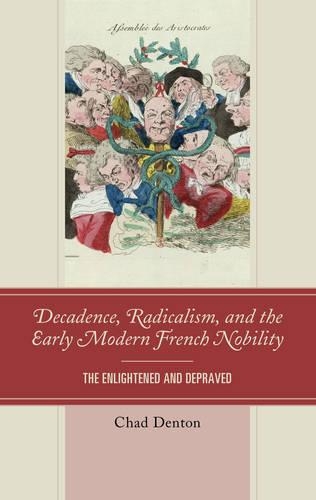
Decadence, Radicalism, and the Early Modern French Nobility: The Enlightened and Depraved
(Hardback)
Publishing Details
Decadence, Radicalism, and the Early Modern French Nobility: The Enlightened and Depraved
By (Author) Chad Denton
Bloomsbury Publishing PLC
Lexington Books
1st December 2016
United States
Classifications
Professional and Scholarly
Non Fiction
Social and cultural history
European history
305.52
Physical Properties
Hardback
180
Width 159mm, Height 238mm, Spine 17mm
472g
Description
The image of the debauched French aristocrat of the seventeenth and eighteenth centuries is one that still has power over the international public imagination, from the unending fascination with the Marquis de Sade to the successes of the film Ridicule. Drawing on memoirs, letters, popular songs and pamphlets, and political treatises, The Enlightened and Depraved: Decadence, Radicalism, and the Early Modern French Nobility traces the origins of this powerful stereotype from between the reign of Louis XIV and the Terror of the French Revolution. The decadent and enlightened noble of early modern France, the libertine, was born in a push to transform the nobility from a warrior caste into an intelligentsia. Education itself had become a power through which the privileged could set themselves free from old social and religious restraints. However, by the late eighteenth century, the libertine noble was already falling under attack by changing attitudes toward gender, an emphasis on economic utility over courtly service, and ironically the very revolutionary forces that the enlightened nobility of the court and Paris helped awaken. In the end, the libertine nobility would not survive the French Revolution, but the basic idea of knowledge as a liberating force would endure in modernity, divorced from a single class.
Reviews
This book . . . should be of interest to scholars seeking to understand the boundaries of libertine behavior and how eighteenth-century French nobles used libertinage to maintain their status even as it ultimately led to a decline of that status by the end of the eighteenth century. * Journal of the History of Sexuality *
In taking seriously the libertine association with sodomy and adultery as not merely sexual scandal, but as a form of moral defiance and an expression of skepticism, Chad Denton asks how changing notions of noble self-understanding competed with, and often undermined, royal efforts to manage and subdue the French nobility. In so doing, Denton makes a compelling case for the significance of the libertine ethos, with its celebration of personal sexual freedom and rejection of religious orthodoxy, as an important element in the political culture of pre-Revolutionary France. -- Katherine B. Crawford, Vanderbilt University
Chad Denton's important study explores how the early modern French nobility's own tendencies to relinquish traditional military and land ownership roles in favor of an intellectual and libertine existence at Versailles and the salons led to their demise. Fuelled by Enlightenment ideals, libertine nobles of the seventeenth and eighteenth centuries began to employ sodomy and adultery as philosophical and political statements. Denton persuasively argues that the growing identification of the haute noblesse as an exclusively libertine, irreligious, and amoral social group made them vulnerable and helped to pave the way for the French Revolution. -- Una McIlvenna, University of Kent
With the popularity of works like Lacloss Dangerous Liaisons, the history of the libertine French nobility has long been of interest to scholars and non-scholars alike, but has not been the subject of a complete study in English, until now. Writing in fluid and engaging prose, Chad Denton pulls on a wide array of sources to present the history of this fascinating group. He re-conceptualizes the meaning of elite libertinism from simple resistance to governing social, religious, and sexual norms, to a means by which the elite nobility justify their privilege as an order. This argument will surely open up discussion on the nature of the nobility in the Old Regime as well as the importance and meaning of libertinism. -- Nina Kushner, Clark University
Author Bio
Chad Denton earned his PhD in history from the University of Missouri.
